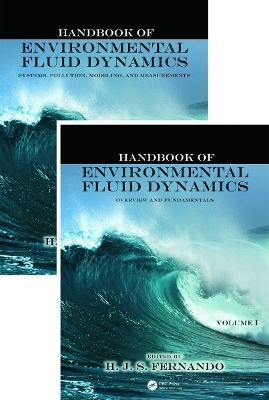
Handbook of Environmental Fluid Dynamics, Two-Volume Set
CRC Press
978-0-367-57027-9 (ISBN)
- Titel z.Zt. nicht lieferbar
- Versandkostenfrei innerhalb Deutschlands
- Auch auf Rechnung
- Verfügbarkeit in der Filiale vor Ort prüfen
- Artikel merken
With major implications for applied physics, engineering, and the natural and social sciences, the rapidly growing area of environmental fluid dynamics focuses on the interactions of human activities, environment, and fluid motion. A landmark for the field, this two-volume Handbook of Environmental Fluid Dynamics presents the basic principles, fundamental flow processes, modeling techniques, and measurement methods used in the study of environmental motions. It also offers critical discussions of environmental sustainability related to engineering.
The handbook features 81 chapters written by 135 renowned researchers from around the world. Covering environmental, policy, biological, and chemical aspects, it tackles important cross-disciplinary topics such as sustainability, ecology, pollution, micrometeorology, and limnology.
Volume One: Overview and Fundamentals provides a comprehensive overview of the fundamentals, including introductory topics, general principles, and fundamental flow types. It emphasizes the close relevance of environmental fluid dynamics research in society, public policy, infrastructure, quality of life, security, and the law. The book explores established and emerging areas related to environmental fluid dynamics. It also describes sub-mesoscale flow processes and phenomena that form the building blocks of environmental motions.
Volume Two: Systems, Pollution, Modeling, and Measurements explores the interactions between engineered structures and natural flows. It also discusses the major topic of environmental pollution, with a focus on numerical methods, predictive modeling, and computer infrastructure developments. The book also looks at practical aspects of laboratory experiments and field observations that validate quantitative predictions and help identify new phenomena and processes.
As communities face existential challenges posed by climate change, rapid urbanization, and scarcity of water and energy, the study of environmental fluid dynamics becomes increasingly relevant. This wide-ranging handbook is a valuable resource for students, researchers, and policymakers working to better understand natural motions and how they affect and are influenced by anthropogenic activities.
Harindra Joseph Shermal Fernando is the Wayne and Diana Murdy Endowed Professor of Engineering and Geosciences at the University of Notre Dame, with the primary affiliation in the Department of Civil and Environmental Engineering and Earth Sciences and a concurrent appointment in the Department of Aerospace and Mechanical Engineering. He has received numerous awards and honors, including a UNESCO Team Gold Medal (1979), Presidential Young Investigator Award (NSF, 1986), and Rieger Foundation Distinguished Scholar Award in Environmental Sciences (2001). He is a fellow of the American Society of Mechanical Engineers, American Physical Society, and American Meteorological Society and was elected to the European Academy in 2009. He serves on the editorial boards of Applied Mechanics Reviews (associate editor), Theoretical and Computational Fluid Dynamics (editor, 1997–), IAHR Journal of Hydro-Environment (associate editor), Physics of Fluids (associate editor) and EGS Journal of Non-Linear Processes in Geophysics (editor). He is also the editor in chief of the Journal of Environmental Fluid Dynamics. Professor Fernando has published more than 225 papers spanning nearly 50 international peer-reviewed journals.
Volume One: Overview and General Topics. Focus Areas for Study of Natural Systems. Fundamental Flow Phenomena and Turbulence. Volume Two: Engineered Systems and Anthropogenic Influence. Environmental Pollution. Numerical Modeling of Environmental Flows. Laboratory Modeling of Environmental Flows. Environmental Measurements.
| Erscheint lt. Verlag | 30.9.2020 |
|---|---|
| Verlagsort | London |
| Sprache | englisch |
| Maße | 219 x 276 mm |
| Gewicht | 453 g |
| Themenwelt | Mathematik / Informatik ► Mathematik ► Angewandte Mathematik |
| Naturwissenschaften ► Physik / Astronomie ► Strömungsmechanik | |
| Technik ► Umwelttechnik / Biotechnologie | |
| Weitere Fachgebiete ► Land- / Forstwirtschaft / Fischerei | |
| ISBN-10 | 0-367-57027-0 / 0367570270 |
| ISBN-13 | 978-0-367-57027-9 / 9780367570279 |
| Zustand | Neuware |
| Haben Sie eine Frage zum Produkt? |